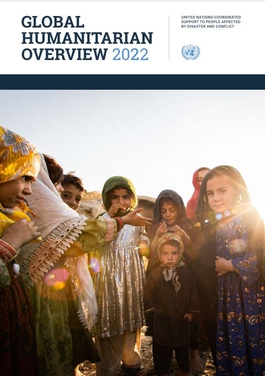
Humanitarian aid is material and logistic assistance to people who need help. It is usually short-term help until the long-term help by the government and other institutions replaces it. Among the people in need are the homeless, refugees, and victims of natural disasters, wars, and famines. Humanitarian relief efforts are provided for humanitarian purposes and include natural disasters and human-made disasters. The primary objective of humanitarian aid is to save lives, alleviate suffering, and maintain human dignity. It may, therefore, be distinguished from development aid, which seeks to address the underlying socioeconomic factors which may have led to a crisis or emergency. There is a debate on linking humanitarian aid and development efforts, which was reinforced by the World Humanitarian Summit in 2016. However, the conflation is viewed critically by practitioners.

An aid agency, also known as development charity, is an organization dedicated to distributing aid. Many professional aid organisations exist, both within government, between governments as multilateral donors and as private voluntary organizations or non-governmental organisations. The International Committee of the Red Cross is the world's second oldest humanitarian organisation and is unique in being mandated by international treaty to uphold the Geneva Conventions. The Sovereign Order of Malta, established in 1099 as the Order of St. John of Jerusalem, has an unbroken tradition of over 900 years of hospitaller activities, continuing to this day. Even in its modern guise under international law, it was recognized at the Congress of Verona of 1822, and since 1834 headquartered in Palazzo Malta in Rome, decades before the Red Cross.

The Directorate-General for European Civil Protection and Humanitarian Aid Operations, formerly known as the European Community Humanitarian Aid Office, is the European Commission's department for overseas humanitarian aid and for civil protection. It aims to save and preserve life, prevent and alleviate human suffering and safeguard the integrity and dignity of populations affected by natural disasters and man-made crises. Since September 2019, Janez Lenarčič is serving as Commissioner for Crisis Management in the Von der Leyen Commission, and since 1 March 2023, Maciej Popowski leads the organisation as the Director-General.

A humanitarian crisis is defined as a singular event or a series of events that are threatening in terms of health, safety or well-being of a community or large group of people. It may be an internal or external conflict and usually occurs throughout a large land area. Local, national and international responses are necessary in such events.

The New Humanitarian, previously known as IRIN News, or Integrated Regional Information Networks News, is an independent, non-profit news agency. It specializes in humanitarian stories from often overlooked or under-reported regions.

The Swiss Agency for Development and Cooperation (SDC) is an office-level agency in the federal administration of Switzerland, and a part of the Federal Department of Foreign Affairs. Together with other federal offices, SDC is responsible for overall coordination of Swiss international development activities and cooperation with Eastern Europe, as well as humanitarian aid.
There are a number of meanings for the term humanitarian. Here, humanitarian pertains to the practice of saving lives and alleviating suffering. It is usually related to emergency response whether in the case of a natural disaster or a man-made disaster such as war or other armed conflict. Humanitarian principles govern the way humanitarian response is carried out.

Humanitarian Accountability Partnership International, established in 2003, was the humanitarian sector's first international self-regulatory body. A multi-agency initiative working to improve the accountability of humanitarian action to people affected by disasters and other crises, HAP members ranged from organisations with a mandate for emergency relief and development activities to institutional donors. The organisation aimed to strengthen accountability towards those affected by crisis situations and to facilitate improved performance within the humanitarian sector. The ultimate goal of the organisation was to uphold the rights and the dignity of crisis-affected populations across the world.

Adeso is Nairobi-based humanitarian non-governmental organization.

The United Nations World Humanitarian Summit (WHS) was held in Istanbul, Turkey, on May 23 and 24, 2016. The summit was an initiative of the Secretary-General of the United Nations Ban Ki-moon and was organized by the United Nations Office for the Coordination of Humanitarian Affairs.
In the realm of humanitarian aid, Cash and Voucher Assistance (CVA) is recognized as an umbrella term for two of the common modalities of assistance for delivering swift and flexible humanitarian aid support to populations affected by various crises, the third being in-kind assistance.

The CALP Network is an organisation originating in 2005 and officially launched in 2009 as The Cash Learning Partnership, with the objectives of increasing the scale and quality of Cash and Voucher Assistance (CVA) employed by humanitarian agencies around the world to deliver aid. CVA encompasses aid delivered as cash, or vouchers exchangeable for goods and services, directly to recipients, and represents an increasingly significant aid modality amounting to 21% of total international humanitarian assistance expenditure in 2022. CALP works to build CVA capacity within aid organisations, especially by providing training and e-learning; coordinates the use of CVA by agencies; compiles and shares knowledge and research; and contributes to the development of policy environments encompassing CVA.
The 2019–2020 Congo River floods resulted from torrential rains from October 2019 to January 2020 that caused the overflow of the Congo and Ubangi rivers, floods and landslides throughout the Democratic Republic of Congo (DRC) and Republic of Congo (RoC) and led to the displacement of hundreds of thousands of people.

The Grand Bargain: Agenda for Humanity, usually called the Grand Bargain, is an agreement to reform the delivery of humanitarian aid, that was struck at the World Humanitarian Summit in May 2016. The agreement contains 51 specific commitments, grouped into ten focus areas, with activity targets to be completed by January 1, 2020.

The Network for Empowered Aid Response, often called the NEAR Network, is a group of humanitarian civil society organisations based in Africa, Asia, and the Middle East.

The Humanitarian Cluster System is a system, used by the United Nations Office for the Coordination of Humanitarian Affairs, to coordinate multi-agency responses to large humanitarian emergencies.

The State of the Humanitarian System is a recurring report that was first published by ALNAP in 2010 and is updated every two or three years.

Global Humanitarian Overview is an annual report published by the United Nations Office for the Coordination of Humanitarian Affairs.
Degan Ali is the Somali-American humanitarian consultant and the executive director of Adeso.

How America Gets Away With Murder is a 2005 book by Canadian legal scholar Michael Mandel about the legality of United States and NATO military interventions in Yugoslavia, Iraq, and Afghanistan.
















